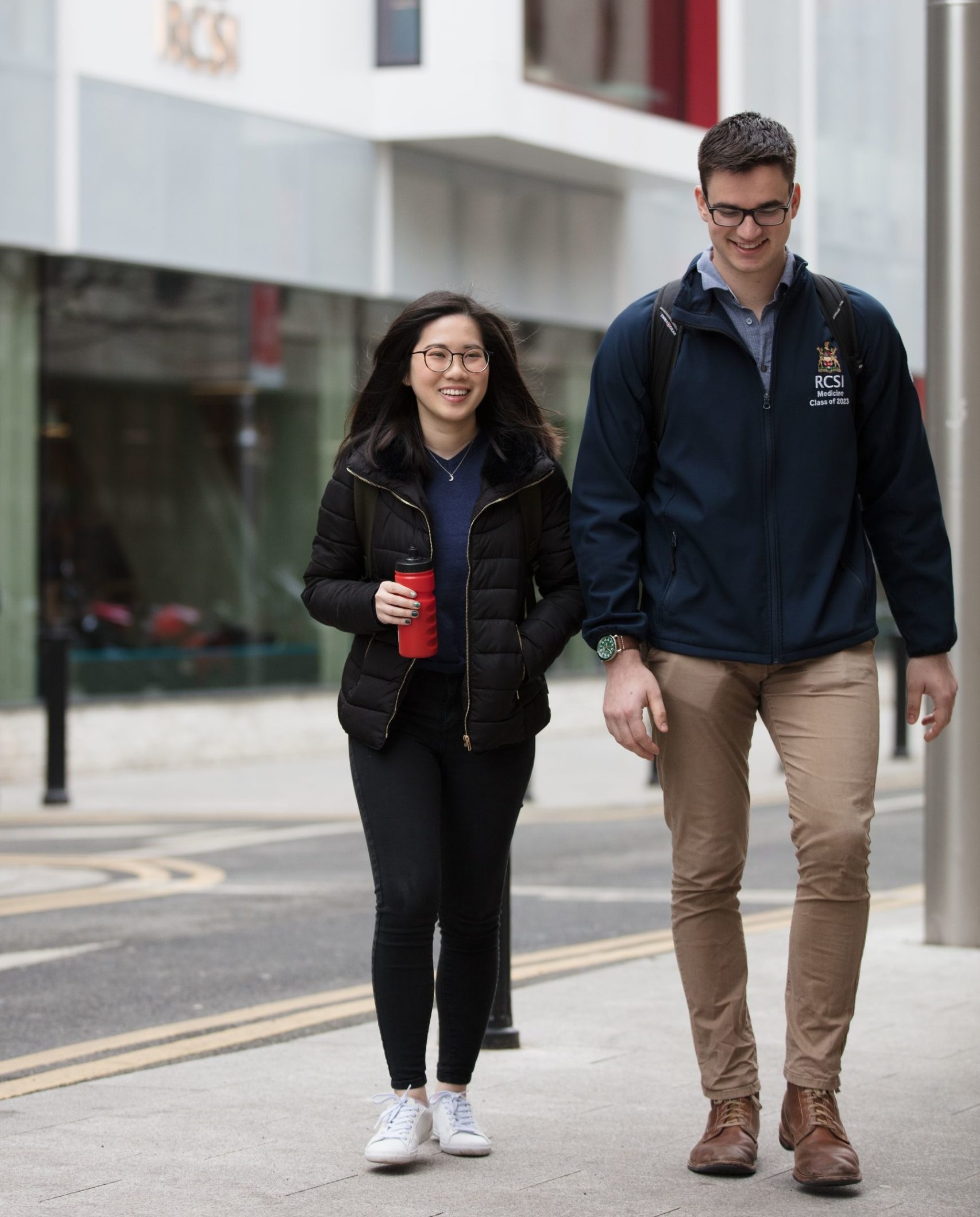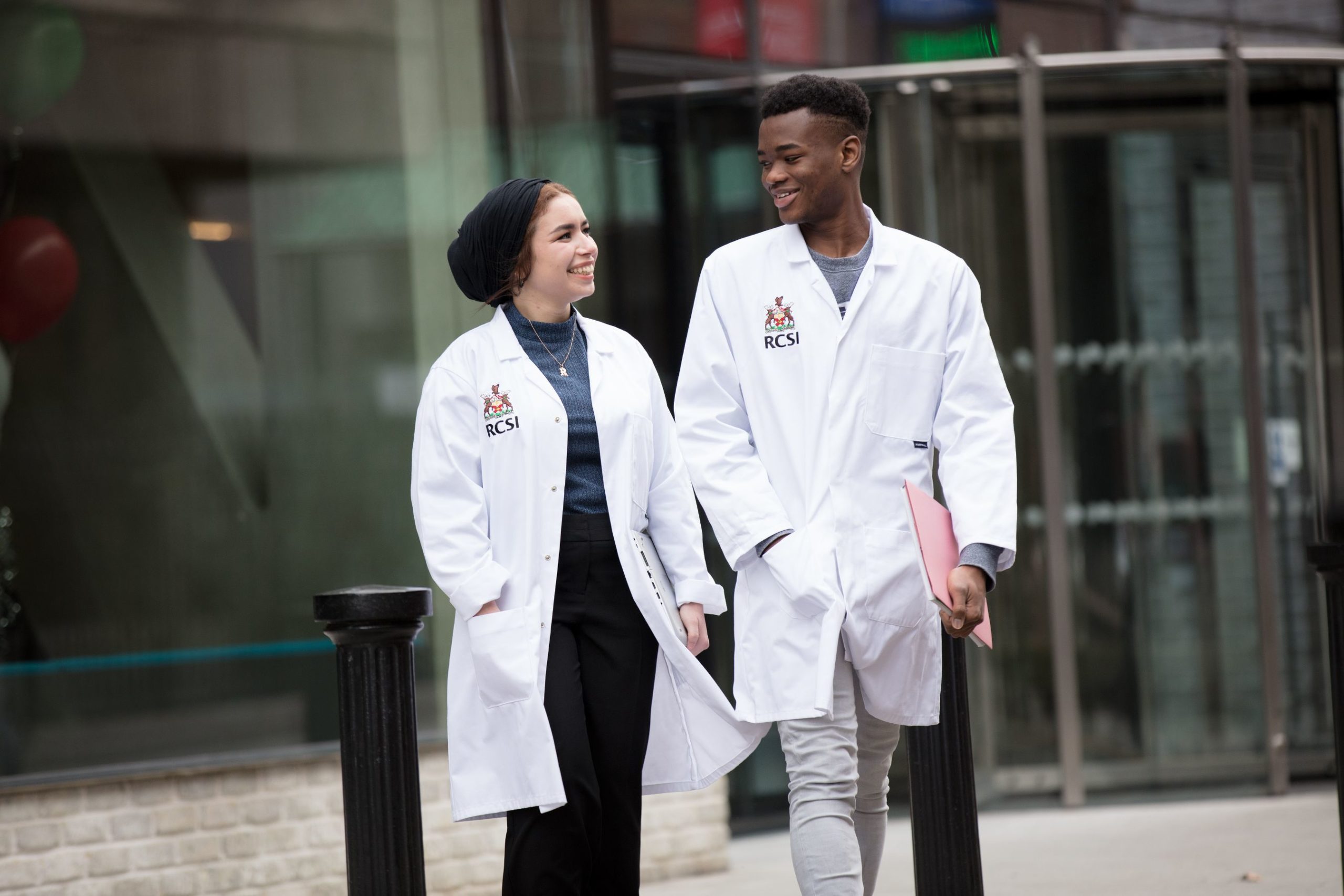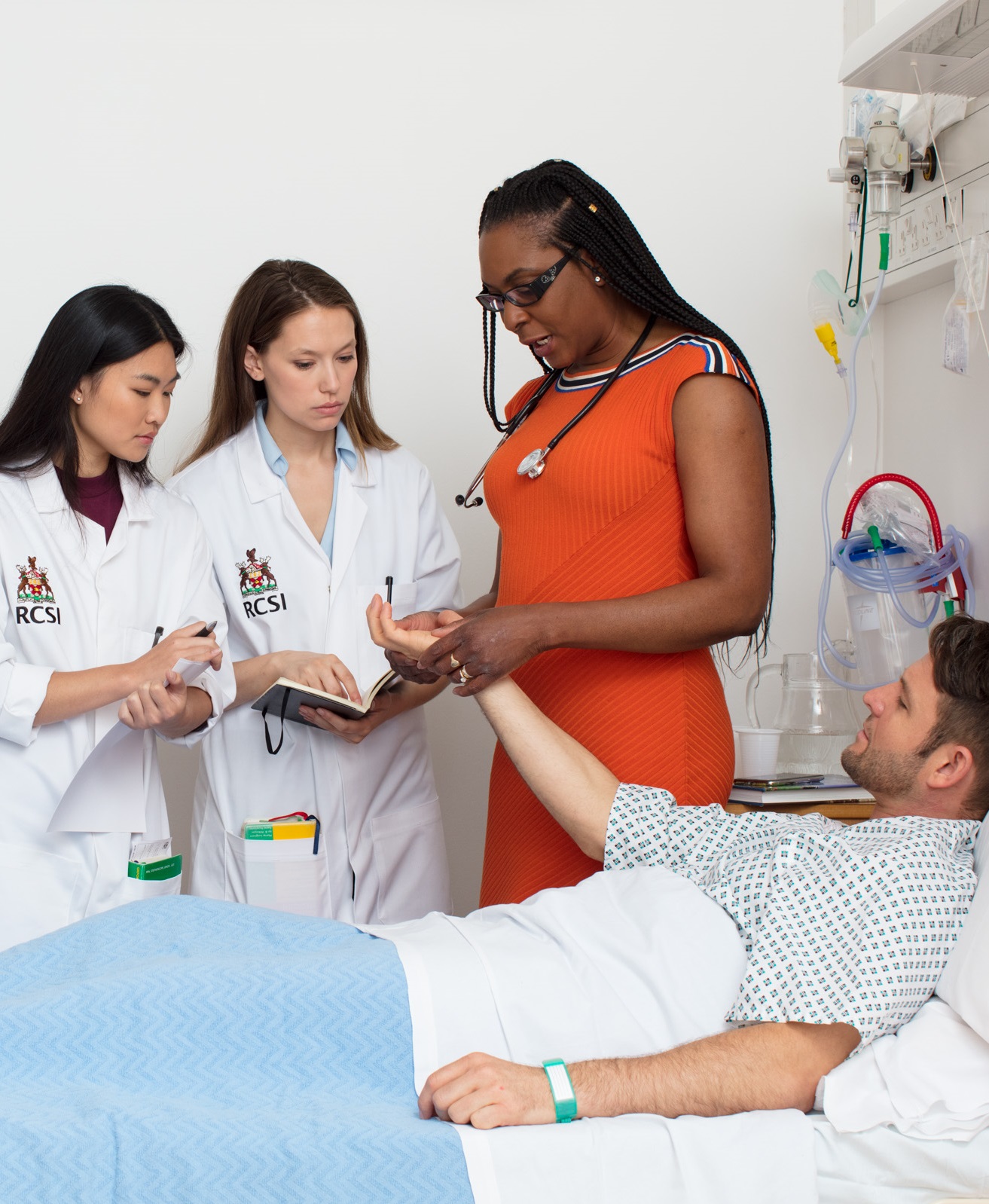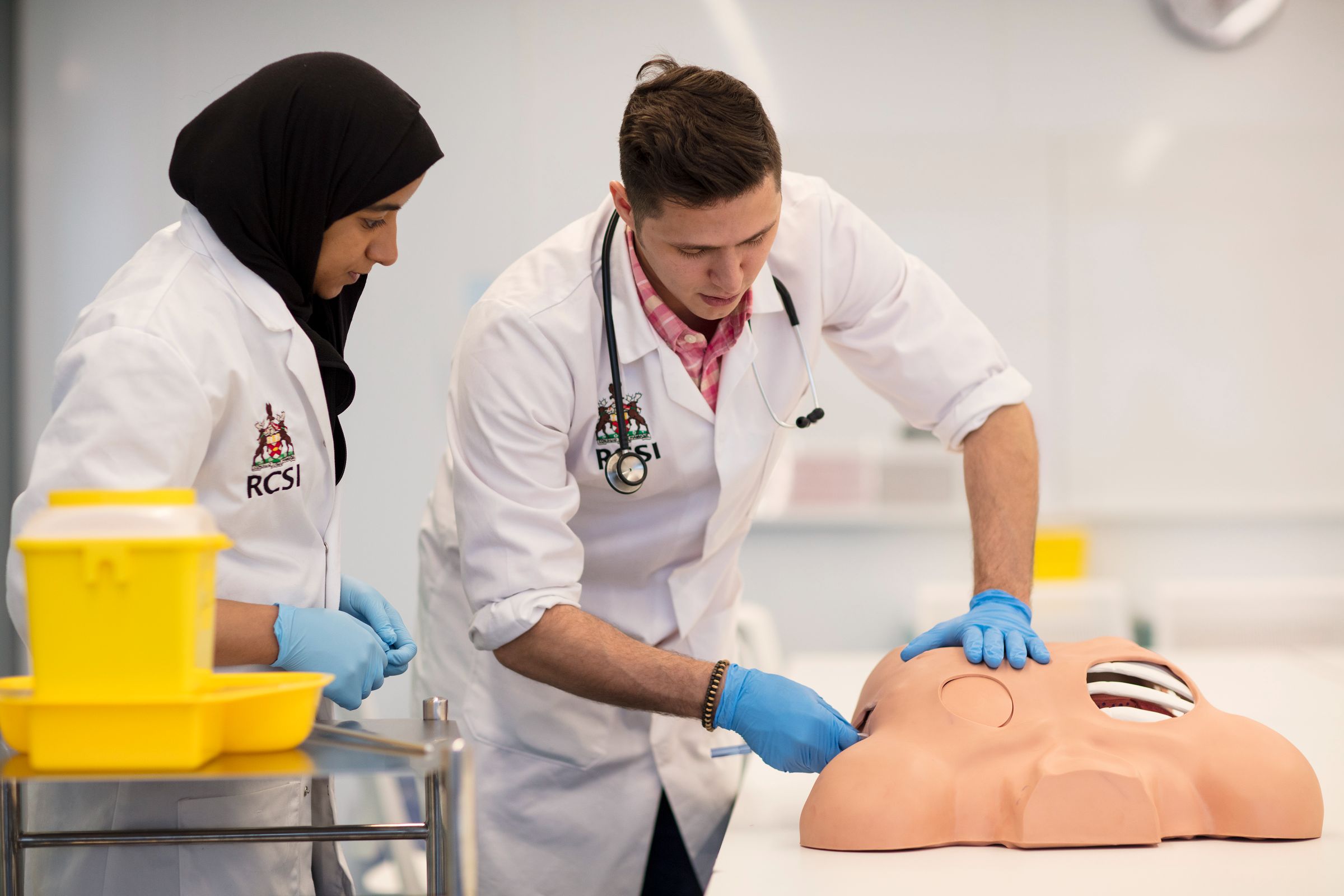RCSI University of Medicine and Health Sciences

RCSI is a specialist health sciences university based in Dublin, the capital city of the Republic of Ireland, offering undergraduate and graduate entry degree programmes in Medicine, Pharmacy, and Physiotherapy. RCSI University of Medicine and Health Sciences is ranked #1 in the world by Times Higher Education for its contribution to the United Nations’ Sustainable Development Goal #3 ‘Good Health and Well-being’. This reflects the University’s commitment to supporting people of all ages to live healthy lives and it’s work to promote the concepts of well-being and positive health.
RCSI is also one of only a few prestigious medical schools to be recognised by the ASPIRE programme, which assesses international excellence in education in a medical, dental or veterinary school. The ASPIRE programme follows a rigorous peer-review process to measure and benchmark medical schools for world-class excellence in education.
Your eligibility for the Five-Year or Six-Year Undergraduate Medicine program will depend on your academic background including the courses you have taken and your level of achievement. Students presenting AP and IB examinations may be eligible for five year offers. Candidates who have completed one or more years of college/university are usually considered for the Five-Year Undergraduate Medicine program.
IMPORTANT NOTE: Students applying to RCSI and whose transcripts show that they are on track to meet the minimum academic entry requirements will be invited to register for and sit the Casper SJT as part of the admissions assessment.
In 2023, RCSI introduced an updated minimum age policy for international (Non-EU) students. This change applies to all international applicants, beginning with those who commenced their studies with us in September 2024.
Non-EU applicants must normally have attained the age of 18 years by 1 December following entry to RCSI.
Six-year track with High School Diploma
Canadian High School Diploma: Applicants must present a minimum average score of 85% in their top six Grade 12 academic subjects, which must include minimum scores of 80% in Biology, Chemistry and either Physics, Mathematics or Calculus.
US High School Diploma: Applicants must present a minimum overall GPA of 3.5, including minimum GPA of 3.0 in Biology, Chemistry and either Physics, Mathematics or Calculus. SAT or ACT is required. Applicants must present either a minimum ACT score of 25, or a minimum SAT score of 1,200.
Five-year track with AP Examinations (exempt from Foundation Year)
Applicants who meet the six-year track entry requirements and present three Advanced Placement (AP) examinations may be eligible for consideration for the five-year track. Applicants must present AP Chemistry, AP Biology and a third AP from the group; Calculus, Physics or Psychology. Applicants are required to present scores of 5, 5, 4 in their three AP examinations (in any combination).
Five-year track with IB Examinations (exempt from Foundation Year)
Applicants must present a minimum score of 38 IB Diploma points (inclusive of bonus points). The IB Diploma must comprise a minimum of six subjects* (three subjects at Higher Level and three subjects at Standard Level), which must include Chemistry at Higher Level (with a minimum score of 5) and another laboratory science subject (Biology or Physics) or Mathematics** at Higher Level. If Mathematics is presented with Chemistry at Higher Level, another laboratory science subject (Biology or Physics) must also be presented at Standard Level.
Five-year track with Some College
Applicants who have completed one or two years of an undergraduate Science degree are welcome to apply. Applicants who are taking courses that include General Chemistry and Biology will be considered for the five-year track, while those without sufficient General Chemistry and Biology will be considered for the six-year track. Applicants are required to submit competitive GPAs for all years that they have completed within their chosen program.
Six-year track with IB Examinations
Applicants must present a minimum score of 36 IB Diploma points (inclusive of bonus points). The IB Diploma must comprise a minimum of six subjects* (three subjects at Higher Level and three subjects at Standard Level), which must include English, Mathematics** and at least one Higher Level laboratory science subject (Chemistry, Biology or Physics).
*All IB Diploma subject examinations must be taken within two consecutive academic years (i.e. school years 11 and 12). Any repeat examinations taken outside of these two years will not be considered.
**Both Mathematics: Analysis and Approaches and Mathematics: Applications and Interpretation are acceptable for application to RCSI.
Four-Year Graduate Entry Medicine
To be eligible for the Four-Year Graduate Entry Medicine program students are required to have completed their degree program prior to August of the year of entry and must also have taken the MCAT by January of the year of entry. A minimum undergraduate cGPA of 3.0 on a 4.0 scale and minimum MCAT of 503 or minimum GAMSAT of 60 are required. The MCAT/GAMSAT must have been written within 4 years. e.g. test dates no earlier than August 2022 for 2026 entry. Canadian students should refer to the OMSAS Conversion Table for equivalency.
Applicants who pass RCSI’s initial evaluation will be invited to an online interview. Atlantic Bridge will provide specific guidance on your eligibility based on the information you submit on your Application Request Form.
Please visit the RCSI website for more detailed information on joining RCSI’s 5/6 Year Programs and Graduate Entry Medicine Program as an undergraduate medical student.
RCSI is one of the most internationally-focused medical schools in the world. More than 20% of students undertaking the RCSI medicine degree come from Canada or the United States.
As a student on the RCSI medicine program, you will have the opportunity to learn in Europe’s largest Clinical Simulation Centre. Training suites are designed to mirror the hospital environment and include clinical skills labs, a mock operating theatre and clinical training wards. Avail of state-of-the-art sports facilities and modern on-campus accommodation, as well as having the opportunity to participate in a wide variety of RCSI clubs and societies. Study in the heart of Dublin, one of Europe’s most historic and vibrant capital cities.
Students undertake summer research and/or clinical electives at prestigious universities in Canada and the US including the Johns Hopkins Hospital Group, Columbia University Medical Center and the Mayo Clinic. Students receive unrivaled personal, academic and career supports. RCSI students undertake Residency Pathway Programs for Canada and the US. They also receive intensive support in preparing for both MCCQE and USMLE licensing exams.
RCSI graduates regularly match to competitive specialties in prestigious institutions across Canada and the US, including Cleveland Clinic, Harvard University, McGill University, McMaster University and University of Toronto.


At RCSI, their history meets cutting-edge technology. Their city-center campus is located right in the heart of Dublin and is built to meet the needs of current and future students. The campus is easily accessed by public transport and surrounded by cultural hotspots, shops, cafés and restaurants. Countless healthcare careers have been launched at its Dublin Campus over the last 240 years and this still remains an incredible place to study to become a healthcare professional.
RCSI's flagship 26 York Street building is the most advanced clinical healthcare simulation center in Europe – it is an award-winning teaching, research and recreational facility spanning 10 floors. The centerpiece of this building is the 12,000 sq. ft. multi-disciplinary National Surgical & Clinical Skills center, the first of its kind outside the United States. This center is designed to mirror a real hospital, with surgical and training suites including clinical skills labs, a mock operating theatre and clinical training wards. The specialist health science library spans three floors to ensure their students have access to the facilities and resources required to become the best healthcare professional and the sports center and gym in the basement of the building ensure students can comfortably fit in a workout between study sessions.
RCSI's 123 St Stephen's Green building is one of the most iconic buildings in Dublin city center. One of the most significant learning spaces on campus is here in the original building, the Anatomy Room. It has been in the same location since it first opened in 1812. Students will also find some of the large lecture theatres, payer rooms, meditation spaces, exam halls and careers and student services at 123 St. Stephen’s Green.
RCSI has a strong IT platform, including a virtual learning environment called Moodle. Moodle facilitates online curriculum mapping and assessment and assists self-directed learning in the four-year program.
Throughout the program, each student has a designated academic mentor to assist with his or her understanding of the curriculum.
Exposure to the hospital setting occurs progressively from the end of the second year. The hospital attachments program begins with an introductory clinical course in the final term of the second year, comprising lectures, clinical demonstrations and bedside tutorials. From the beginning of the third year, students attend hospitals, taking rotations in Medicine, Surgery, Pediatrics, Psychiatry, Obstetrics and Gynecology, Community Health, General Practice and Ophthalmology/Otolaryngology.
RCSI offers a contemporary medicine curriculum with a strong focus on early patient contact, the acquisition of excellent clinical, technical and communications skills, and on your development as a medical professional.
RCSI offers a five- and six-year Undergraduate Medicine program, as well as a four-year Graduate Entry Medicine program, at our Dublin City Centre campus. So, whatever your academic background or experience to date, RCSI has a medicine program that meets your needs.
During your early years studying Medicine at RCSI, you will obtain a solid grounding in the biomedical sciences and you will learn about the body structure and functions in its normal state. You will study anatomy with expert surgeons and other healthcare professionals through regional cadaveric dissection.
The intermediate years of your medicine program will focus on learning about abnormal bodily functions and you will participate in a wide array of clinical skills workshops, small group tutorials and case-based teaching sessions. A lot of your time will be spent in a hospital setting attached to clinical teams. The final years of the medical program are spent fully immersed in various clinical specialties on a rotational basis.
RCSI is committed to producing clinically skilled doctors with the most relevant and robust experience required to work in today’s health systems. Throughout your time at RCSI, you will have the opportunity to develop your clinical, communication and professional skills in a safe, simulated environment in Europe’s largest and most modern clinical simulation facility and by training in Ireland’s leading hospitals. We also provide you with many opportunities to build your career outside of the classroom through research and clinical electives as well as sub-internships.
Please note: undergraduate medicine programs in Ireland are traditionally six years in duration. You may be exempt from Year 1 and complete the program in five years, depending on your high school or college qualifications (e.g. if you have completed enough science credits in the early years of an undergraduate degree program).
For more detailed program information, please visit the RCSI website.
RCSI was the first medical school in the Republic of Ireland to introduce a Graduate Entry Medicine (GEM) program in 2006, enabling students from a range of undergraduate backgrounds to study medicine. The curriculum is delivered over four cycles: Junior, Intermediate, Senior 1 and Senior 2.
The core biomedical sciences, medical sciences, behavioral sciences, and clinical competencies form the basis of system-based teaching and learning in the Junior and Intermediate Cycles. The two Senior Cycle years concentrate on the delivery of clinical medicine and its sub-specialties.
In your first year as a GEM student, you will be taught in a dedicated teaching facility on the main St Stephen’s Green campus, while in the second year you will spend most of your time in RCSI’s dedicated teaching space at Connolly Hospital Blanchardstown in Dublin. In your final two years, you will be on clinical rotations in a variety of hospitals and GP practices in Dublin and throughout the country.
As an RCSI GEM graduate, you will be ‘career ready’. In fact, your clinical skills training starts from day one of the program, with simulated patient sessions being a weekly feature of the curriculum.
For more detailed program information, please visit the RCSI website.
RCSI has been educating North American students since the 1970’s. The University has an alumni network in North America in excess of 2,000 doctors, many of whom are working in some of the most prestigious hospitals and healthcare institutions in the USA and Canada.
RCSI understands that, for most North American students, the priority is to secure a competitive residency and get back to North America after graduation. RCSI faculty and students work together to ensure that candidates are completely ready when applying for residency and consistently secure residency placements at elite programs in North America. A list of these placements can be found on the RCSI Prospectus 2021 .
To ensure that their students are successful in returning to North America after graduation, RCSI provides a variety of resources many of which sit with the CoMPPAS Office (Centre of Mastery: Personal Professional & Academic Success).
The CoMPPAS office is home to a dedicated multi-disciplinary team of specialists working collaboratively to facilitate and empower students to achieve their personal, academic and professional goals. The services provided by CoMPPAS are available to all students, allowing them to maximize their potential and enhance their performance. Careerhub is an online platform which provides access to the students’ career portfolio, resources, events, workshops and consultations. This provides the platform for the University to work with the students individually to develop a bespoke career strategy for residency.
Everything is designed around the needs of each one of the students and particular supports are given to the ones wishing to return and practice in North America. Not only do the CoMPPAS Team at RCSI support the students throughout their journey at the University, they also provide support to their graduates for up to 3 years postgraduation.


Beaumont Hospital is the College’s principle training and research centre, with 730 beds and approximately 60 patients admitted each day. The James Connolly Memorial Hospital has 350 beds and extensive grounds with buildings spread out over 138 acres of land. Our Lady of Lourdes Hospital was founded in 1939 by the Medical Missionaries of Mary and now provides general and maternity services to the northeast of Ireland, treating 200,000 patients annually.
For the clinical teaching of obstetrics and gynecology, the College’s staff and students work in Dublin’s oldest maternity hospital, the Rotunda Hospital. Students also attend the National Maternity Hospital and the Coombe Women & Infants University Hospital. For pediatrics and neonatal medicine, students attend Our Lady’s Childrens Hospital, Crumlin and the Temple Street Children’s University Hospital in Dublin.

We use cookies on our website to give you the most relevant experience by remembering your preferences and repeat visits. By clicking “Accept”, you consent to the use of ALL the cookies. more information
The cookie settings on this website are set to "allow cookies" to give you the best browsing experience possible. If you continue to use this website without changing your cookie settings or you click "Accept" below then you are consenting to this.